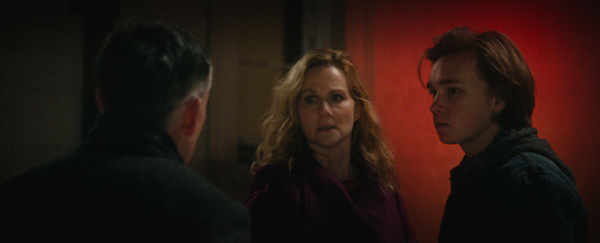Movie review by Greg Carlson
Immediately following the dizzy, frightening, ambiguous, disorienting final scene of Oren Moverman’s “The Dinner,” which ends with a character saying “I love you” and a cut to black, the credits roll while Savages’ “Fuckers” nails the prevailing mood on the soundtrack. Jehnny Beth sings, “Don’t let the fuckers get you down, don’t let them wonder why you frown,” as the audience stumbles into the light, hopefully to do a good deed or maybe take a shower. The song perfectly complements the movie’s satirical portrait of topics ranging from white privilege to sibling rivalry to mental illness to the sometimes grotesque blind spots of parents for the sins of their children.
“The Dinner” was at one point planned as Cate Blanchett’s directorial debut. Based on the novel by Herman Koch (which has already been filmed twice), Moverman adapted the screenplay and ended up at the helm. He enlists a talented ensemble to explore the morals and ethics swirling around the aftermath of a horrific crime: do the wealthy and powerful parents of teenage boys responsible for a ghastly homicide conceal it or face the consequences and pursue a path of transparency and answerability?
The grown-ups, such as they are, include brothers Paul (Steve Coogan) and Stan (Richard Gere), Paul’s wife Claire (Laura Linney), and Stan’s wife Katelyn (Rebecca Hall). Paul, a onetime high school teacher of history whose debilitating emotional struggles appear to be compounded by Stan’s successful political career, will take center stage as the group meets at a chic and expensive restaurant to strategize. Stan, a congressman running for governor, surprisingly emerges as the voice of reason and honesty, an irony not lost on many viewers (and Moverman himself) quick to draw parallels between the timing of the film and the blatant dishonesty and chicanery of the Trump administration.
Moverman gets away from the restaurant in a series of flashbacks. In one, Paul and Stan argue and clash in and around the Gettysburg National Military Park, and the director draws on Stephen Lang-narrated audio excerpts and eerily shot imagery that subjectively intensify Paul’s rapid deterioration. Paul’s poisonous classroom monologues, also on the topic of the Civil War, are less effective. Some have read the Gettysburg interlude as a rather broad metaphor framing fraternal discord, but “The Dinner” also hints at the legacy of slavery in America. Unfortunately, the racist insults inflicted on Stan’s adopted son Beau (Miles J. Harvey) by members of his own family are not deeply investigated.
The mysterious conclusion of the film indicates a deliberate open-endedness meant to provoke thought, but the most damaging flaw of “The Dinner” resides in the enigmatic portrayal of the male cousins before, during, and after the murder. The boys remain unknowable, unreachable, and, in the case of Paul and Claire’s son Michael (Charlie Plummer), frighteningly immoral. Claire’s unwavering support of her boy is more chilling as a result, and Linney — as usual — is tremendous. Each member of the principal cast feasts on juicy moments, and supporting work by the reliably excellent Adepero Oduye as Stan’s aide and Michael Chernus as the restaurant’s lead staffer, elevates the bleakly comedic aspects of the story. The latter’s hilarious running commentary on the farm-to-table/French cuisine mash-up menu items fully exploits the decadence of the rich. When presenting a cheese course, Chernus brags about the previously FDA-quarantined Mimolette, crowing, “But we have it for you tonight.”
